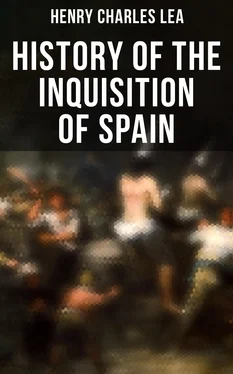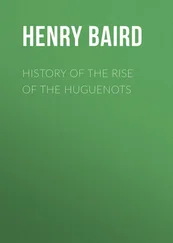CONVERSION AND PERSECUTION
After the death of Jaime, in 1276, the ecclesiastics seem to have thought that they could safely obey the commands of Clement IV, especially as Nicholas IV, in 1278, instructed the Dominican general to depute pious brethren everywhere to convoke the Jews and labor for their conversion, with the significant addition that lists of those refusing baptism were to be made out and submitted to him, when he would determine what was to be done with them.[277] How the frailes interpreted the papal utterances is indicated in a letter of Pedro III to Pedro Bishop of Gerona, in April of this same year, 1278, reciting that he had already appealed repeatedly to him to put an end to the assaults of the clergy on the Jews, and now he learns that they have again attacked the Judería, stoning it from the tower of the cathedral and from their own houses and then assaulting it, laying waste the gardens and vineyards of the Jews and even destroying their graves and, when the royal herald stood up to forbid the work, drowning his voice with yells and derisions. Pedro accuses the bishop of stimulating the clergy to these outrages and orders him to put a stop to it and punish the offenders.[278] He was still more energetic when the French crusade under Philippe le Hardi was advancing to the siege of Gerona, in 1285, and his Moorish soldiers in the garrison undertook to sack the Call Juhich , or Judería, when he threw himself among them, mace in hand, struck down a number and finished by hanging several of them.[279] He offered no impediment, however, to the conversion of the Jews for, in 1279, he ordered his officials to compel them to listen to the Franciscans, who, in obedience to the commands of the pope, might wish to preach to them in their synagogues.[280] These intrusions of frailes into the Juderías inevitably led to trouble, for there is significance in a letter of Jaime II, April 4, 1305, to his representative in Palma, alluding to recent scandals, for the future prevention of which he orders that no priest shall enter the Judería to administer the sacraments without being accompanied by a secular official. This precaution was unavailing, for it doubtless was a continuance of such provocation that led to a disturbance, about 1315, affording to King Jaime an excuse for confiscating the whole property of the aljama of Palma and then commuting the penalty to a fine of 95,000 libras . The source of these troubles is suggested by a royal order of 1327 to the Governor of Majorca, forbidding the baptism of Jewish children under seven years of age or the forcible baptism of Jews of any age.[281]
During all this period there had been an Inquisition in Aragon which, of course, could not interfere with Jews as such, for they were beyond its jurisdiction, but which stood ready to punish more or less veritable efforts at propagandism or offences of fautorship. The crown had no objection to using it as a means of extortion, while preventing it from exterminating or crippling subjects so useful. A diploma of Jaime II, October 14, 1311, recites that the inquisitor, Fray Juan Llotger, had learned that the aljamas of Barcelona, Tarragona, Monblanch and Vilafranca had harbored and fed certain Jewish converts, who had relapsed to Judaism, as well as others who had come from foreign parts. He had given Fray Juan the necessary support, enabling him to verify the accusations on the spot and had received his report to that effect. Now, therefore, he issues a free and full pardon to the offending aljamas, with assurance that they shall not be prosecuted either civilly or criminally, for which grace, on October 10th, they had paid him ten thousand sueldos. In this case there seems to have been no regular trial by the Inquisition, the king having superseded it by his action. In another more serious case he intervened after trial and sentence to commute the punishment. In 1326 the aljama of Calatayud subjected itself to the Inquisition by not only receiving back a woman who had been baptized but by circumcising two Christians. Tried by the inquisitor and the Bishop of Tarazona it had been found guilty and it had been sentenced to a fine of twenty thousand sueldos and its members to confiscation, but King Jaime, by a cédula of February 6, 1326, released them from the confiscation and all other penalties on payment of the fine.[282]
CURTAILMENT OF PRIVILEGES
Although Castile was slower than Aragon to receive impulses from abroad, in the early fourteenth century we begin to find traces of a similar movement of the Church against the Jews. In 1307 the aljama of Toledo complained to Fernando IV that the dean and chapter had obtained from Clement V bulls conferring on them jurisdiction over Jews, in virtue of which they were enforcing the canons against usury and stripping the Jewish community of its property. At this time there was no question in Spain, such as we shall see debated hereafter, of the royal prerogative to control obnoxious papal letters, and Fernando at once ordered the chapter to surrender the bulls; all action under them was pronounced void and restitution in double was threatened for all damage inflicted. The Jews, he said, were his Jews; they were not to be incapacitated from paying their taxes and the pope had no power to infringe on the rights of the crown. He instructed Ferran Nuñez de Pantoja to compel obedience and, after some offenders had been arrested, the frightened canons surrendered the bulls and abandoned their promising speculation, but the affair left behind it enmities which displayed themselves deplorably afterwards.[283]
In spite of the royal favor and protection, the legislation of the period commences to manifest a tendency to limit the privileges of the Jews, showing that popular sentiment was gradually turning against them. As early as 1286 Sancho IV agreed to deprive them of their special judges and, though the law was not generally enforced, it indicates the spirit that called for it and procured its repetition in the Córtes of Valladolid in 1307.[284] Complaints were loud and numerous of the Jewish tax-gatherers, and the young Fernando IV was obliged repeatedly to promise that the revenues should not be farmed out nor their collection be entrusted to caballeros, ecclesiastics or Jews. The turbulence which attended his minority and short reign and the minority of his son, Alfonso XI, afforded a favorable opportunity for the manifestation of hostility and the royal power was too weak to prevent the curtailment in various directions of the Jewish privileges.[285] We have seen, in the preceding chapter, the temper in which the Spanish prelates returned from the Council of Vienne in 1312 and the proscriptive legislation enacted by them in the Council of Zamora in 1313 and its successors. Everything favored the development of this spirit of intolerance, and at the Córtes of Burgos, in 1315, the regents of the young Alfonso XI conceded that the Clementine canon, abrogating all laws that permitted usury, should be enforced, that all mixed actions, civil and criminal, should be tried by the royal judges, that the evidence of a Jew should not be received against a Christian while that of a Christian was good against a Jew, that Jews were not to assume Christian names, Christian nurses were not to suckle Jews and sumptuary laws were directed against the luxury of Jewish vestments.[286]
This may be said to mark the commencement of the long struggle which, in spite of their wonderful powers of resistance, was to end in the destruction of the Spanish Jews. Throughout the varying phases of the conflict, the Church, in its efforts to arouse popular hatred, was powerfully aided by the odium which the Jews themselves excited through their ostentation, their usury and their functions as public officials.
A strong race is not apt to be an amiable one. The Jews were proud of their ancient lineage and the purity of their descent from the kings and heroes of the Old Testament. A man who could trace his ancestry to David would look with infinite scorn on the hidalgos who boasted of the blood of Lain Calvo and, if the favor of the monarch rendered safe the expression of his feelings, his haughtiness was not apt to win friends among those who repaid his contempt with interest. The Oriental fondness for display was a grievous offence among the people. The wealth of the kingdom was, to a great extent, in Jewish hands, affording ample opportunity of contrast between their magnificence and the poverty of the Christian multitude, and the lavish extravagance with which they adorned themselves, their women and their retainers, was well fitted to excite envy more potent for evil because more wide-spread than enmity arising from individual wrongs.[287] Shortly before the catastrophe, at the close of the fifteenth century, Affonso V of Portugal, who was well-affected towards them, asked the chief rabbi, Joseph-Ibn-Jachia, why he did not prevent his people from a display provocative of the assertion that their wealth was derived from robbery of the Christians, adding that he required no answer, for nothing save spoliation and massacre would cure them of it.[288]
Читать дальше












